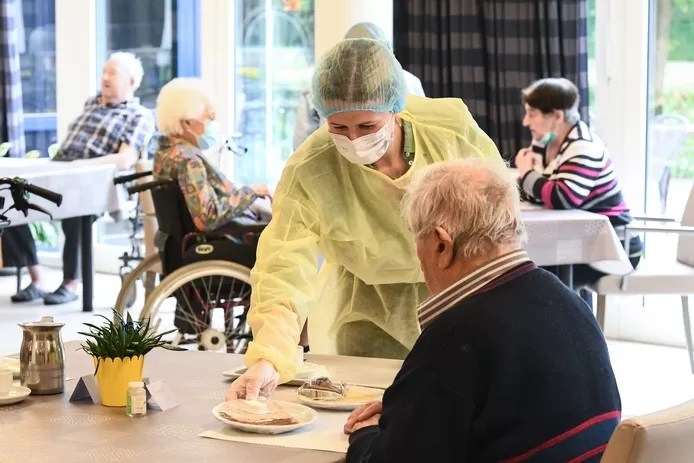The army has deployed 1,500 soldiers to assist Flemish residential care homes where coronavirus infections are surging with the explosion of the Omicron variant.
The number of institutions affected by outbreaks increased from 32 in the last week of 2021 to almost 100 this week, according to reports from Het Laatste Nieuws.
"In 29 residential care centres, there are very large outbreaks with 30 to 50 residents who have tested positive," Johan Staes of the Flemish Independent Care Network (Vlozo) told the daily. He stressed that those who do test positive usually don't have severe symptoms.
The outbreaks mean that residents and staff must quarantine, making it difficult to run the homes. Staff absenteeism has reached 6%, with some 1,800 employees being affected by the outbreaks.
So far, more than 20 soldiers have already been deployed to help prepare meals and transport residents in places where too many staff members are absent. Yet to stop the situation from becoming direr, 1,500 soldiers have now been made available – 200 of them medically trained.
Deploying infected staff
Meanwhile, to further buffer the fallout as a result of major outbreaks, residential care centres and other residential facilities can deploy asymptomatically infected staff to guarantee care, but only when "all other possibilities have been exhausted."
Related News
- Belgium in Brief: Time for a mask upgrade?
- Belgium increasingly recommends FFP2 masks: what you need to know
Infected staff members cannot be forced to work, but the option will be available.
This statement followed earlier calls from care and hospital umbrella organisation Zorgnet-Icuro, which has asked the government to allow infected employees who are not showing any symptoms to also work in non-covid departments. This would be to allow hospitals to continue operating, as many departments now face acute staff shortages due to members isolating.
Salt in the wound: Compulsory FFP2 masks
Amid the worsening epidemiological situation in Flemish care homes, the government announced that staff in residential care centres must now wear FFP2 face masks, which are meant to protect both the wearer and the people in their surroundings.
Furthermore, according to the framework directive issued by the Agency for Care and Health on which the decision was based, visitors will now also be asked to wear medical masks, meaning that cloth face masks are no longer considered sufficient in care homes.
Socialist trade union BBTK recognised the importance of effective protective material against the coronavirus but argued that this measure is too strict, and stressed that having to wear an FFP2 mask for the entire duration of a shift, including during breaks, is "untenable and unnecessary."
"The staff of the residential care centres have been in the front line since the beginning of the corona crisis. First without the necessary protective equipment, with all the consequences that entails, and now they have to apply a stricter directive than in hospitals," BBTK Federal Secretary, Johan Van Eeghem, said.
In a statement, the union asked for the directive to be changed to include periods, during which staff are not in contact with residents when a surgical mask is sufficient. It added that additional breaks are needed in addition to the current ones, and stressed that the masks, which ordinarily cost a maximum of €3 per piece, should be made available free of charge.
The original article was updated to include a statement from the BBTK trade union.

